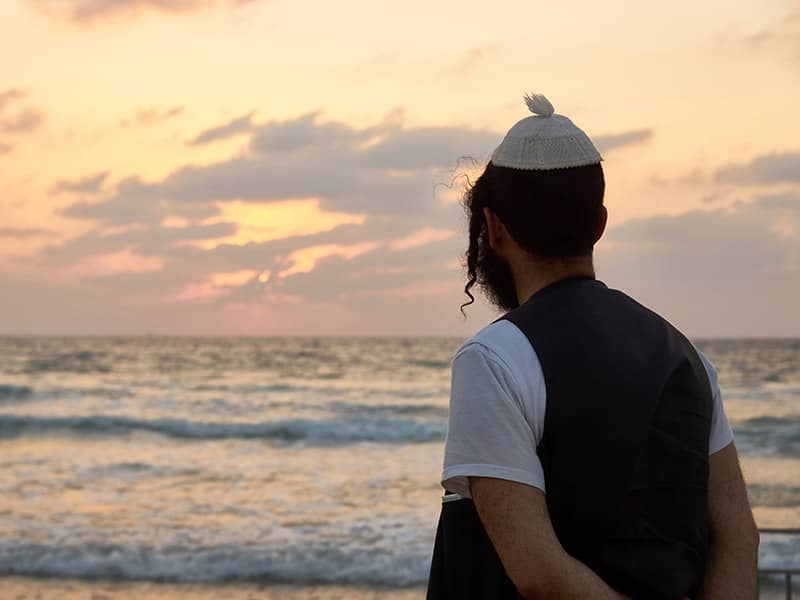I never thought I would have to write about anti-Semitism. Until recently I hadn't experienced it. I might have done. I went to Christian schools, St Mary's Primary, then Christ's College Finchley. We Jews were different and a minority. Yet not once was I insulted for my faith.
Like many others born after the Holocaust, anti-Semitism was something I associated with the past. My late father spoke about it. He had come to Britain as a child fleeing persecution, and he always argued that Polish anti-Semitism went deeper than that of the Germans. It was not until after he died that I discovered that in Kielce, his home town, a pogrom had taken place as late as July 1946. Local Poles shot, stoned, butchered or otherwise murdered 42 Jewish survivors of the Holocaust. Yet despite all he knew, my father never warned me to expect prejudice. If anything, he made a joke of it. "Anti-Semitic traffic lights," he would say whenever they turned red at our approach.
Until now, I have been reticent about talking about anti-semitism. There is all the difference in the world between the virulent anti-Jewishness that dominated western Europe during the 19th century and its genteel English equivalent (perfectly captured in Isabel Colegate's novel, "The Shooting Party," when the host remarks, after the Jewish guest has arrived: "The Semite is among us"). Indiscreet remarks by ambassadors at dinner parties do not constitute a new Dreyfus case. Over-reaction is as foolish as under-reaction. Anti-Semitism is dangerous only when it enters the mainstream of political discourse, something that has not yet happened in Britain.
Then again, some Jews see anti-Semitism as part of Jewish identity. So did Jean-Paul Sartre, who claimed in his "Sur le Question Juif" that the only thing Jews had in common was that they were the victims of hate. It is not Jews who create anti-Semitism, he said, but anti-Semitism that creates Jews. I have fought that view all my adult life. It leads to the tortured psychology of an Arthur Koestler, who wrote: "Self-hatred is the Jews patriotism," or Franz Kafka, who said: "What do I have in common with the Jews? I don't even have anything in common with myself." To me, Jewishness is about moral responsibility, not victimhood; about trust, not fear. Anti-Semitism is something that happens to Jews; it does not define who we are.
Anti-Semitism is so emotive a topic that it helps to perform a thought experiment. Suppose someone were to claim that there is a form of prejudice called anti-kiwism, an irrational hatred of New Zealanders. What might convince us he was right? Criticism of the New Zealand government? No. A denial of New Zealand's right to exist? Maybe. Seven thousand terrorist attacks on New Zealand citizens in the past year? Possibly. A series of claims at the U.N. Conference against Racism in Durban that New Zealand, because of its treatment of the Maori, is uniquely guilty of apartheid, ethnic cleansing and crimes against humanity, accompanied by grotesque Nazi-style posters? Perhaps.
A call to murder all those with New Zealand loyalties even though they were born and live elsewhere? A suggestion that New Zealanders control the world's economy? That they are responsible for AIDS and poisoning water supplies? That they arranged the September 11 attack on the World Trade Center? That they are a satanic force of evil against whom a holy war must be fought? By now we have moved from criticism to hatred to evil fantasy. But delete "New Zealand" and insert "Israel" and "Jews", and all these things have happened in the past year. What more has to happen before an impartial observer concludes that anti-semitism is alive and well and dangerous?
Recently, a cleric in east London was charged with "soliciting to murder" after allegedly distributing videos calling on his followers to attack Jews ("How do you fight the Jews? You kill the Jews.") Within days another video appeared, showing the gruesome murder in Pakistan of American journalist Daniel Pearl. He is shown being forced to kneel and confess that he and his parents are Jewish. His throat is then cut. Over his writhing body, a voice warns: "Other Americans and Jews should be ready to face a fate like Daniel Pearl." This is not polite and genteel. This is the real, ultimately murderous thing.
Anti-Semitism is undeniably the most successful ideology of modern times. Fascism came and went. Soviet communism came and went. Anti-Semitism came and stayed. Its success is due to the fact that, like a virus, it mutates. At times it has been directed against Jews as individuals. Today it is directed against Jews as a sovereign people. The common factor is that Jews, uniquely, are denied the right to exist in whatever form their collective existence currently takes. There is a direct line from "You have no right to live among us as Jews" to "You have no right to live."
What disturbs me is that, were this cumulative hate to be directed against anyone else, the left would be the first to protest. Have we learned nothing from history? An assault on Jews is an assault on difference, and a world that has no room for difference has no room for humanity itself.

